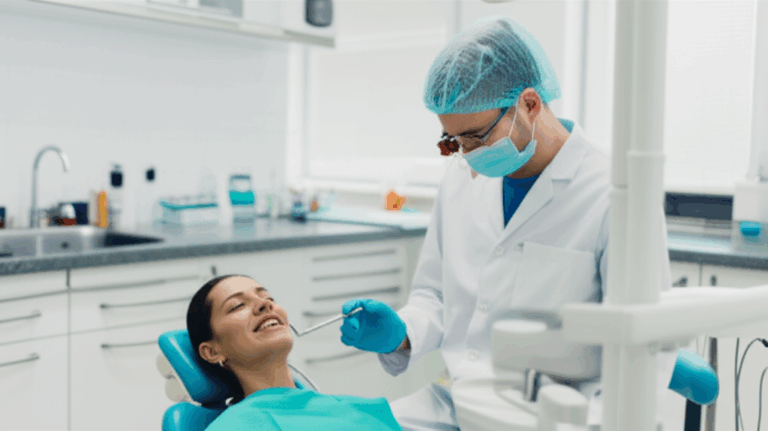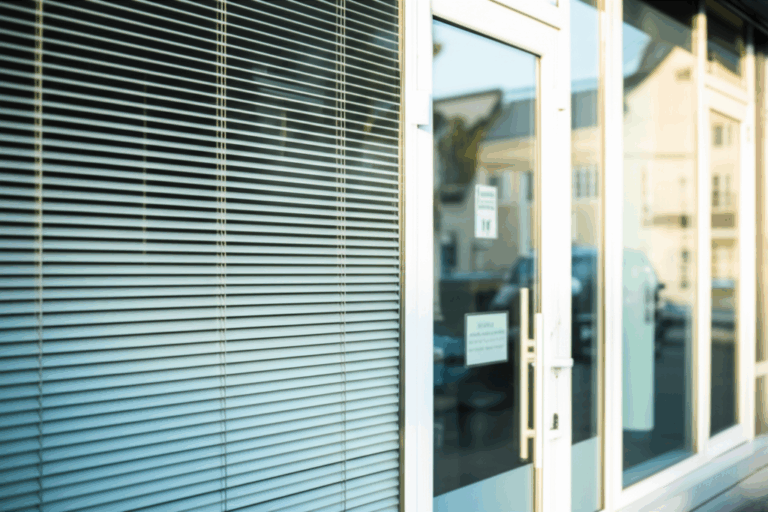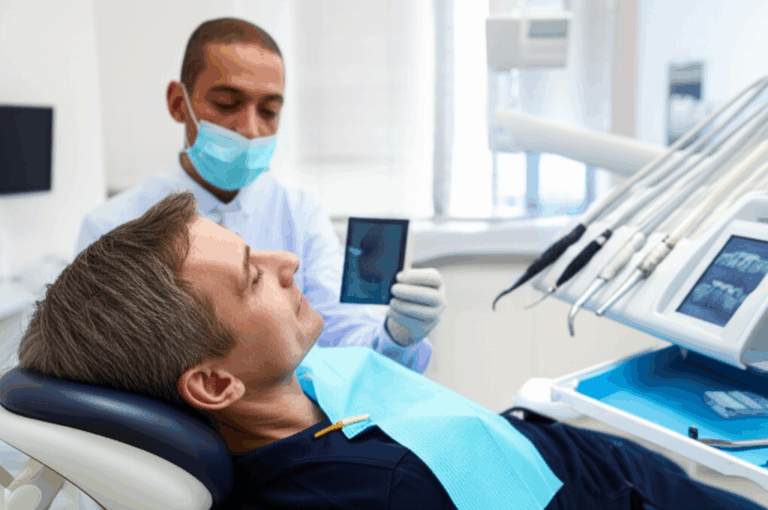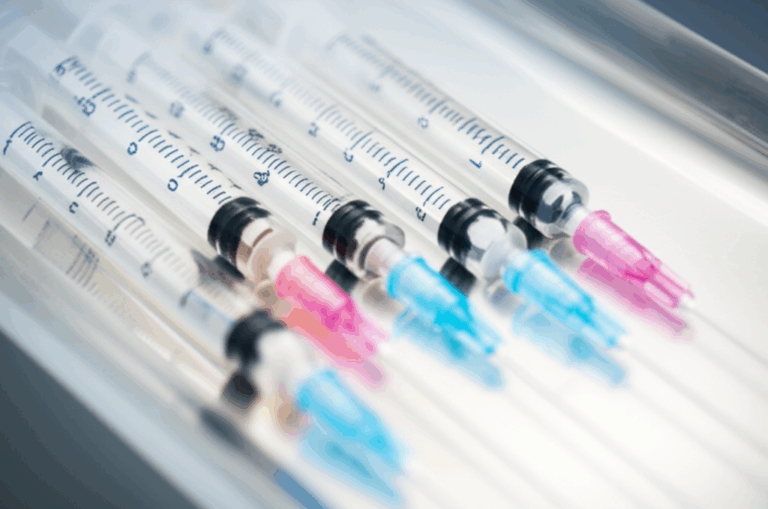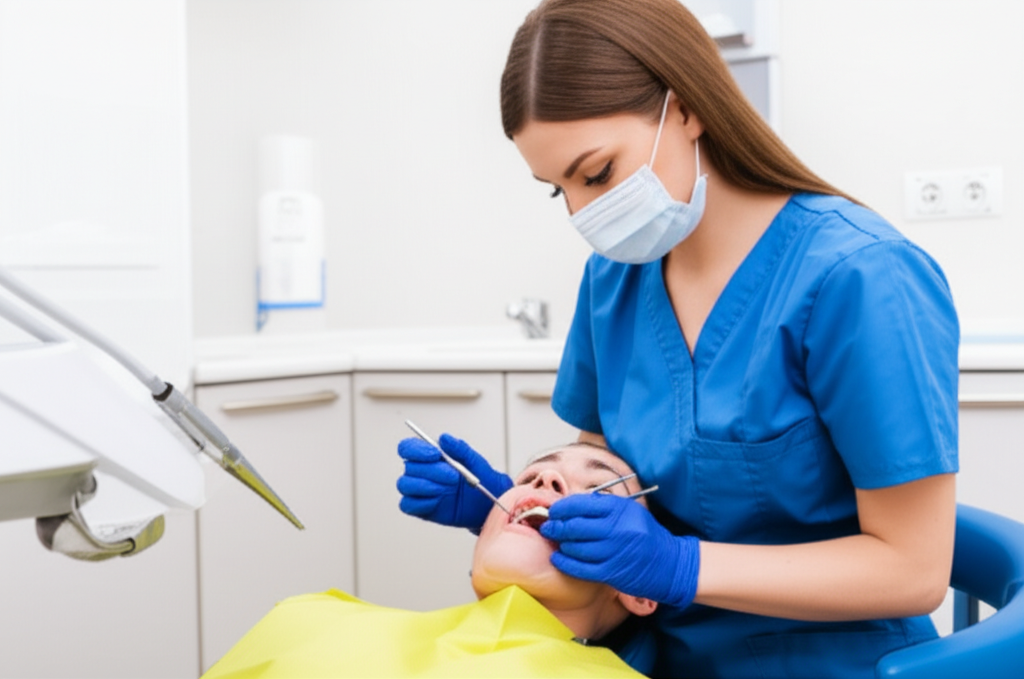
Who Cleans Your Teeth at the Dentist? Understanding the Roles of Your Dental Team
If you’re like most people, you’ve probably asked yourself, “Who actually cleans my teeth at the dentist?” Or maybe you’ve wondered, Why doesn’t the dentist do it every time? It can be a bit puzzling when there are a few people in scrubs—and no one ever hands you a guide before things begin!
Guess what? You’re not the only one thinking this. A lot of people walk into a dental office and wonder who exactly is doing what. Knowing who does what not only helps you relax, but it also helps you trust the people caring for your teeth. Let’s break it all down—from who cleans your teeth, to why the dentist and dental hygienist both matter when it comes to your smile.
In This Article
- Who Is Really Cleaning Your Teeth?
- Meet the Dental Hygienist: The Preventive Care Specialist
- The Dentist’s Role: Diagnosis, Oversight, and Advanced Care
- Step-by-Step: What Happens During a Professional Teeth Cleaning?
- Why Are These Cleanings So Important?
- Common Questions, Honest Answers
- How Do You Choose the Right Dental Office?
- Your Healthy Takeaway: Next Steps to a Healthier Smile
Who Is Really Cleaning Your Teeth?
Let’s answer this up front: Most of the time, it’s not the dentist who’s cleaning your teeth—it’s your dental hygienist. They’re the friendly expert who gives you some cool sunglasses, puts a bib around your neck, and looks at your teeth to see how they’re doing. Dental hygienists mostly take care of checkups and cleanings.
But a dental office works as a team. Sometimes, depending on what you need—or if you have a problem outside your usual check-up—the dentist might join in. Here’s how this works, and why both jobs matter for keeping your mouth healthy.
Meet the Dental Hygienist: The Preventive Care Specialist
What’s a Dental Hygienist?
You can think of a dental hygienist as your first line of defense against things like cavities and gum disease. They are trained health workers whose main goal is to catch and help stop problems with your teeth before they start. They study for years, practice on real patients, and must pass a tough exam to become licensed.
What Does a Dental Hygienist Do?
During your cleaning visit, your hygienist will usually:
- Remove plaque and tartar: They use special tools (like a tiny, gentle water blaster called an ultrasonic scaler) to break away buildup you can’t remove at home.
- Polish your teeth: A gritty paste and a spinning toothbrush wheel are used to make your teeth smooth and shiny.
- Add fluoride treatments: This shiny coating helps protect teeth from cavities, especially for kids and people who get many cavities.
- Take X-rays: X-rays help find hidden problems under the surface.
- Check your mouth for early signs of trouble: Your hygienist may be the first to spot the beginnings of gum disease or even signs of oral cancer.
- Give advice on tooth care: Don’t know the best way to brush, floss, or what foods to eat for healthy teeth? Them can help.
Why Is the Hygienist So Important?
Think about keeping up a car. Brushing and flossing at home is like washing it and checking oil. But sometimes you need an expert to get in there, clean out all the gunk, look for problems, and catch trouble before it gets bad. Skipping regular dental cleanings is like waiting until your car breaks down—it’s often too late.
Hygienists are experts in prevention: they help you avoid more than just cavities and gum disease, but even things that can affect your whole body—like heart issues and diabetes.
The Dentist’s Role: Diagnosis, Oversight, and Advanced Care
Where Does Your Dentist Fit In?
Your dentist is the team leader. While hygienists handle checkups and prevention, the dentist checks the big picture and helps with any tricky problems. Most dentists come in after your cleaning for a full checkup. They:
- Look for trouble in your mouth: Dentists find cavities, gum issues, and check for things like signs of oral cancer.
- Make plans if problems are found: If your hygienist sees something wrong, the dentist decides what to do next—maybe a filling, a deeper cleaning, or another treatment.
- Do advanced procedures: Dentists take care of work like fillings, crowns, root canals, taking out teeth, and more.
- Lead the team: Dentists supervise the dental hygienists and assistants to make sure everyone is safe and gets good care.
Dentist vs. Hygienist: Working Together
It’s like your dental visit is a relay race. The hygienist handles your cleaning and checks, then the dentist comes in for the final part. They trust each other’s skills, and work together for your healthy teeth. Sometimes, if you need special help (like a really deep cleaning because of gum problems), the dentist may do part of the cleaning too.
Step-by-Step: What Happens During a Professional Teeth Cleaning?
If you haven’t been to the dentist in a while, or it makes you a bit nervous, knowing what happens helps. Here’s what a typical cleaning visit is like:
1. Start & X-rays
Your hygienist asks about your health history, looks at your mouth, and may take some X-rays if you need them. X-rays find problems you can’t see, like small cavities between teeth or bone loss from gum disease.
2. Scaling: Removal of Plaque and Tartar
With hand tools and electric gadgets, your hygienist removes soft plaque and hard tartar (also called calculus) from your teeth. Don’t feel bad—everyone gets tartar! Once it forms, you can’t brush or floss it off by yourself.
3. Polishing
A spinning brush and gritty paste are used to clean the tooth surfaces and get rid of any last bits of plaque or stains.
4. Flossing
Your hygienist flosses between each of your teeth. This isn’t just to show off—it helps make sure every spot is really clean.
5. Fluoride Treatment
Your hygienist may add a fluoride gel or varnish. This only takes a few minutes, but it can really help stop cavities.
6. Dentist Exam
Now the dentist checks your X-rays, looks at your gums, tongue, cheeks, and roof of your mouth, and sees if there are any problems. They’ll tell you what they find and talk about what to do next if anything shows up.
A Dental Cleaning Is Still Much Better Than Brushing and Flossing at Home!
Even if you brush and floss every day, you can’t clean off tartar once it’s hard—that’s what your dental cleaning is for.
If you ever need a crown, veneer, or bridge, that work is often done by a crown and bridge lab or other dental lab that your dentist works with.
Why Are These Cleanings So Important?
You might wonder: “If I already brush and floss well, do I really need a cleaning at all?” The answer is yes—because regular cleanings are about preventing and catching problems early.
1. Stops Cavities and Gum Disease
Professional cleanings remove buildup that you miss at home. If you skip them, bacteria can cause cavities and gum infections. Studies show cleanings help lower your risk by around half.
2. Freshens Breath
Bad breath is usually from tartar, food debris, or gum problems. Getting your teeth cleaned means cleaner, fresher breath—and tips for keeping it that way.
3. Finds Trouble Early
Checkups mean small problems get found and fixed before they become big, painful, or expensive.
4. Gives You Better Overall Health
Bad teeth and gums can make health issues like heart problems or diabetes worse. Clean teeth support your whole body health.
5. Protects Dental Work
If you already have fillings, crowns, implants, or dentures, regular cleanings help keep them and your mouth working well.
Quick Fact:
People who get professional cleanings twice a year see much less gum trouble than those who skip. That means less pain and more peace of mind.
Common Questions, Honest Answers
Lots of people have questions about dental cleanings. Here are simple answers.
How Often Should I Get My Teeth Cleaned?
Usually every six months, but if you have gum disease or other issues, you might need to come more often.
Is Cleaning Painful?
Most cleanings don’t hurt, but you might feel a little pressure or odd tickling. Sensitive teeth or gums? Tell your hygienist—they can go slower or use numbing gel.
Can I Just Clean My Teeth at Home?
Brushing and flossing at home is super important! But once tartar forms, you can’t get it off. You still need professional cleanings.
What’s the Difference Between a Regular Cleaning and a Deep Cleaning?
A regular cleaning cleans above the gum line. A deep cleaning goes below to remove bacteria if you have gum disease. It sometimes needs numbing medicine.
Do Kids or People With Braces Get Cleanings Too?
Yes! Hygienists know how to clean around braces or dental work, and can help kids too.
Will My Insurance Pay for Cleanings?
Most dental insurance plans cover one or two a year. Not sure? Ask your dental office—they’ll help you find out.
I’m Nervous or Embarrassed—Is That Okay?
Of course! Many people feel this way. Dental teams are used to it and want you to be as comfy as possible. Just let them know.
How Do You Choose the Right Dental Office?
You can shop around. Great dental care is about more than skills—it’s about feeling welcome and getting answers. Look for:
1. A Skilled, Licensed Team
Make sure the clinic has qualified dental hygienists and dentists. You can always check their credentials or read reviews.
2. A Focus on Prevention
The best offices teach you how to care for your teeth, not just treat you. They let you ask questions and give tips for home care.
3. Comfort and Communication
You should feel safe bringing up any concerns. The right team listens and explains things so you understand.
4. Up-to-Date Tools
Modern tools—like digital X-rays and better cleaning devices—make your visit better and help spot problems sooner.
5. Teamwork and Referrals
A good dentist knows when you need a specialist, like an implant dental laboratory for implants or another expert.
Your Healthy Takeaway: Next Steps to a Healthier Smile
Let’s wrap up the major points:
Key Points:
- For most checkups and cleanings, the dental hygienist does the work—they are well trained in prevention.
- Dentists check your whole mouth, make treatment plans, and handle advanced procedures.
- Regular cleanings keep your teeth and gums healthier—plus, they can help your whole body feel better!
- Home care is important, but you still need checkups and cleanings.
- The best dental offices focus on prevention, answer questions, and help you feel relaxed.
What Should You Do Now?
Remember, taking care of your teeth isn’t just about looks—it’s about feeling good, eating your favorite foods, and staying healthy. If you’re not sure about something during your dental visit, just ask! Your dental hygienist and dentist are there to help, every step of the way.
References:
- American Dental Association (ADA)
- American Dental Hygienists’ Association (ADHA)
- Centers for Disease Control and Prevention (CDC)
- Journal of Clinical Periodontology
- Cochrane Reviews
- American Academy of Periodontology
Medically reviewed by a licensed dental health professional.
Want to learn more? Check out our practical guide for easy tips or get more answers on our patient dental page.
A smile is a powerful thing—let’s keep yours bright, together!

